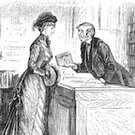Author: Thomas Coutts Nelson
Author: Thomas Coutts Nelson (1839–1885)
Alternate Name(s): Percy Baldinnie (pseudonym); Quintin Quiz (pseudonym)
Biography: Thomas Coutts Nelson was born in 1839 in Cupar, Fife, the son of gardener John Nelson and Anne Nelson (née Coutts). He served his apprenticeship as a clerk in a lawyer’s office and continued in this profession for W. A. Taylor, solicitor, Cupar. After eight years, he began contributing short stories to the People’s Journal under the pseudonym "Quintin Quiz" and to the People’s Friend under the pseudonym "Percy Baldinnie." In 1865 his story "The Lamplighter; or, The Foundling of Christmas Morn" won first prize (and £5) in the People’s Journal's annual Christmas literary competition. In 1876 he published a three-volume novel What Old Father Thames Said as "Coutts Nelson" which achieved moderate success. Over the years, he contributed serial novels to the Jedburgh Gazette, Aberdeen People’s Journal, Fife News, and the Kirkcaldy Mail. Alongside his brother who was the librarian, he acted as assistant librarian in the Duncan Institute, Cupar, and briefly as librarian after his brother’s death. In 1880 he applied to the position of Principal Assistant of the Advocate’s Library, Edinburgh, but was unsuccessful. In 1864 he married Agnes Coutts, his second cousin, also of Cupar Fife, at Tron Parish Church in Edinburgh. They had four children, including twins, between 1866 and 1870. Sometime between 1871 and 1881, Nelson’s wife was admitted to the Fife and Kinross District Asylum as a pauper patient described as a "lunatic." She died in the asylum in 1903. Nelson died of severe bronchitis in 1885 and was buried in Kilconquhar Parish Cemetery. (CL)
Author Tags:
References: Fife Herald (16 December 1885)
Fiction Titles:
- What Old Father Thames Said: A Novel. 3 vol. London: Samuel Tinsley, 1876.
